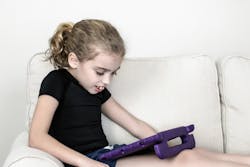Digital autism screening tool shows promise in NIH-funded study
A tablet-based screening application for autism spectrum disorder (ASD) may improve early detection, suggests a study funded by the National Institutes of Health.
Early detection is critical for access to early interventions that can have major long-term positive effects on symptoms and later skills. The app showed 87.8% sensitivity for detecting ASD, meaning it correctly identified most children with the condition. Its specificity—the percentage of children without ASD who screened negative—was 80.8%. By accurately identifying toddlers who warrant further investigation for ASD, the app may help healthcare providers ensure that children and families receive the support they need.
To address the need for more accurate ASD screening tools, researchers developed the SenseToKnow app, which records and analyzes children’s responses to short movies designed to elicit a range of behavioral patterns. The app can track many early signs of ASD, including differences in social attention, facial expressions, head movements, response to name, blink rates and motor skills. The work was led by Geraldine Dawson, Ph.D., and Guillermo Sapiro, Ph.D., of the Autism Center of Excellence at Duke University, Durham, North Carolina.
Healthcare providers used SenseToKnow to screen toddlers ages 17 months to 3 years during a well-child visit. Of the 475 toddlers enrolled in the study, 49 were subsequently diagnosed with ASD and 98 were diagnosed with developmental delays without ASD. The app’s ability to reliably detect children diagnosed with ASD was consistent across toddlers of different sex, race and ethnicity. Overall, participants who screened positive for ASD using the app had a 40.6% probability of subsequently being diagnosed with the condition. In comparison, only about 15% of children who screen positive using the standard parent questionnaire are later diagnosed with ASD. Combining the app with the standard questionnaire boosted the probability of a positive screen resulting in later diagnosis to 63.4%.

